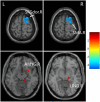Examining Brain Function Changes in HIV-Infected Patients With Asymptomatic Neurocognitive Impairment: A Longitudinal Study
- PMID: 40566924
- PMCID: PMC12198476
- DOI: 10.1002/brb3.70559
Examining Brain Function Changes in HIV-Infected Patients With Asymptomatic Neurocognitive Impairment: A Longitudinal Study
Abstract
Background: HIV-associated neurocognitive disorders (HAND), especially asymptomatic neurocognitive impairment (ANI), the initial stage of HAND, persist among a substantial proportion of individuals living with HIV despite the introduction of combination antiretroviral therapy (cART). Resting-state functional magnetic resonance imaging (rs-fMRI) focusing on ANI among HIV-related patients is rarely reported.
Methods: 60 right-handed Chinese male patients with HIV-associated ANI underwent baseline and follow-up neurocognitive examination, and rs-fMRI scans over an average interval of 1.68 years. Brain function alterations were evaluated through amplitude of low-frequency fluctuation (ALFF/fALFF), regional homogeneity (ReHo), and functional connectivity (FC) analyses.
Results: In this study, significant reductions in ALFF were observed in the MOG, cuneus, superior frontal gyrus, and supplementary motor area in the follow-up group compared to baseline. This was accompanied by increased ALFF in the right insula. ReHo analysis revealed decreased values in the left median cingulate, right calcarine fissure, MOG, and left precentral gyrus, alongside increased ReHo in the supramarginal gyrus, postcentral gyrus, parahippocampal gyrus, and calcarine fissure. FC analysis demonstrated decreased connectivity between the precentral gyrus and calcarine cortex and between the MOG and calcarine cortex. Correlation analysis indicated that these imaging changes were correlated with declines in specific neurocognitive domains, including memory, speed of information processing, and executive function.
Conclusion: Our research demonstrates a gradual deterioration in brain function in HIV-positive individuals with ANI despite receiving cART. This decline correlates with worsening neurocognitive abilities, specifically visual processing and executive function.
Keywords: HIV‐associated neurocognitive disorders; amplitude of low‐frequency fluctuation; asymptomatic neurocognitive impairment; functional connectivity; regional homogeneity.
© 2025 The Author(s). Brain and Behavior published by Wiley Periodicals LLC.
Figures






References
-
- AIDS and Hepatitis C Professional Group . 2021. “Society of Infectious Diseases, Chinese Medical Association; Chinese Center for Disease Control and Prevention. [Chinese Guidelines for Diagnosis and Treatment of HIV/AIDS (2021 Edition)].” Zhonghua Nei Ke Za Zhi [Chinese Journal of Internal Medicine] 60, no. 12: 1106–1128. - PubMed
-
- Bao, A.‐M. , and Swaab D. F.. 2011. “Sexual Differentiation of the Human Brain: Relation to Gender Identity, Sexual Orientation and Neuropsychiatric Disorders.” Frontiers in Neuroendocrinology 32, no. 2: 214–226. - PubMed
-
- Dash, S. 2023. “Molecular and Cellular Alterations Underlying Neurological Outcomes in HIV Infection.” In RNA Viruses and Neurological Disorders , 61–79. CRC Press.
MeSH terms
Grants and funding
LinkOut - more resources
Full Text Sources
Medical

